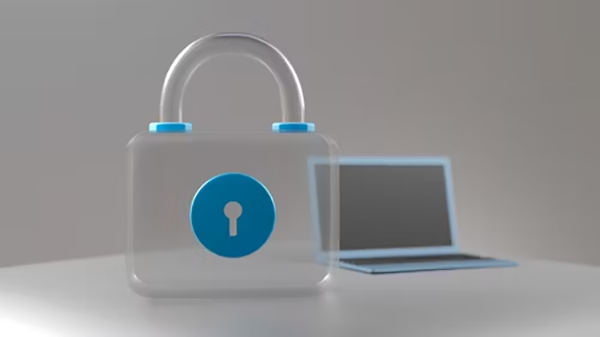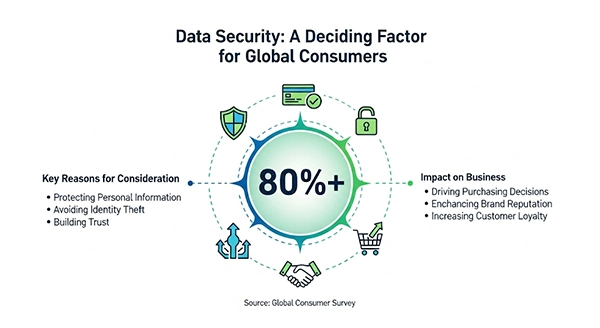
In the corporate world, trust is the currency that defines a business’s success or failure. First in 2023, 1.9 million end users globally reported significant cases of cyber attacks.
Now, a 2024 report by IBM says, the average cost of a data breach reached an all-time high of $4.88 million, an alarming figure that doesn’t even account for the significant loss of customer trust and loyalty.
This financial and reputational risk has propelled data security from a mere technical concern to a fundamental business imperative. As customers have become unwilling to compromise on privacy, organizations are innovating and implementing advanced security measures to preserve the integrity of sensitive data.
A security-first work ethic and strict adherence to privacy regulations are no longer optional—they are the key to building a loyal customer base and a formidable brand reputation in a volatile digital landscape.
Let’s understand it deeply!
KEY TAKEAWAYS
- Data security is critical for building customer trust and loyalty, which can be quickly destroyed by a data breach.
- Adhering to regulations like GDPR and using tools like AML screening shows a brand’s commitment to ethical data handling.
- Platforms must be transparent about data collection and usage, and proactively communicate about security incidents to maintain loyalty.
- Implementing back-up plans, threat intelligence, and multi-factor authentication keeps platforms one step ahead of cybercriminals and builds user confidence.
- Regular internal and external security audits help identify vulnerabilities early and demonstrate a commitment to continuous innovation and risk management.
Customer loyalty is complicated to sustain. It doesn’t matter how much reputation you’ve built over the years; an undefended breach can ruin it all. In fact, 71% of respondents say they’ll stop patronizing a company after a successful data breach.
As a result, customers are vigilant about organizations that prioritize their privacy over profit margins. Here’s an extensive breakdown of how data-secure platforms have a competitive edge over rivals.

Good first impressions are essential for commercial success because they create enduring memories. Organizations demonstrate their dedication to ethical and legal data management when they rigorously follow financial rules like GDPR and Anti-Money Laundering laws.
For example, if you manage a fintech or financial institution like a bank, integrating AML tools for booking platforms into security workflows can monitor and identify anomalous activities in real time, preventing money theft and maintaining compliance with privacy regulations.
This robust AML mechanism is typical of a tool like SEON, which is suited for digital businesses that want to integrate fraud detection and AML screening to enhance their security profiles and alleviate customers’ concerns about cyberattacks.
Don’t think of clients as being too demanding. Customers are naturally more wary of your adherence to privacy standards in an era where hackers and scammers are wreaking havoc on the digital landscape.
Platforms that go above and beyond to showcase certifications and unambiguous privacy policies keep customers abreast of their security standards and have a greater chance of boosting customers’ confidence.
When utilized properly, website cookies may be quite beneficial. However, if explicit data consent is not requested, they may irritate users and cause them to leave your site. Customers have concerns about certain platforms since they don’t allow consumers to refuse cookie access.
In addition to putting security first, data secure platforms don’t just prioritize security but maintain transparency by being clear about how they collect customer data, what the data is being used for, and how the data is handled. With these, your customers are more enthusiastic to trust your platform with their information and continue engaging with your site.
This transparency extends to keeping customers updated on modifications in privacy policies and data incidents that result from malicious attacks, insider threats, system failures, and more. While the latter might be a bitter pill to swallow, you can’t risk safeguarding customers in the dark.
Sharing this data shows the platform’s accountability and the value it places on user rights, which is fundamental for long-term customer loyalty.

It’s no secret that cybercriminals have grown increasingly vicious over time, keeping abreast of technological developments to spot potential weaknesses in security systems. In order to innovate to step up their security tactics, platforms must also continue.
Data-secure platforms execute backup plans that counteract threats, like regularly implementing strategies like threat intelligence, security monitoring, and incident response planning, among others. This illustrates your dedication to protecting client data integrity before dangers materialize.
Data security involves more than just addressing problems when they arise; it also involves searching for flaws and irregularities that might allow hackers to access your program. You are one step of cyber criminals and insider threats that might leverage these loopholes to attack your database.
Last but not least, data security involves creating security awareness and training programs to make sure that every team member understands and complies with security protocols, leaving no room for mistakes. Customers’ concerns over the security of their data are allayed by this strict discipline, which promotes more interaction and enduring loyalty.

In a time when automated password hacking systems are becoming prevalent, adding an extra layer of security, such as multifactor authentication to pins and passwords, is all you would need to disorient hackers. These verification methods include security questions and authenticator apps, answers, and biometrics like fingerprint scans, voice, and facial recognition.
These solutions are used by platforms to safeguard consumer accounts, particularly those that manage massive financial transactions and portions of user data.
Additionally, user accounts are protected on several levels by this protection system. Curious? When login attempts to exceed limits, some systems automatically block user access for a given period and send notifications of suspicious activities through channels like emails and text messages, enabling real users to deter the attack.
In severe situations, if there are several unsuccessful attempts, the account can be temporarily blocked until the original user fixes the issue. Security measures like these can embolden customer trust, especially those with sensitive or classified data, providing them with a sense of security and certainty regarding the validity of your safety standards.

Cyberattacks are common in the digital world, and even websites that emphasize security can become targets if they let their guard down. In case of a breach, what really sets a data-secure platform apart from the rest is how swiftly it detects and proactively counters the attack.
Typically, data-secure sites invest massively in automated security solutions and maintain a specialized incident response team ready to respond to security breaches. This team is prominent for its strong communication mechanisms that make it easier to promptly tell impacted consumers about breaches and how they may stop the assault.
Rapid crisis management reduces harm and enables you to accept responsibility without delay. In contrast to platforms with slow incident response times, data-secure sites record better brand engagement and significantly greater retention rates.
No matter how robust you think your security protocols are, you are still required to gauge their efficiency and ensure they’re not outdated. You can do this by carrying out a consistent and time-consuming routine audit, both internally and externally. This approach presents your platform as committed to ongoing innovation and risk control.
Frequent audits assist you in locating your platform’s defects and irregularities before hackers take advantage of them. By determining vulnerabilities early on, platforms can ensure meticulous adherence to privacy laws and maintain industry standards at all times. This behavior pattern of vigilance reinforces customers’ validation of your security posture.
Furthermore, audit reports provide more than just information concerning weaknesses; distributing them to your stakeholders, partners, and clients demonstrates openness regarding the scope and dependability of your security procedures.
Most of the time, all of your clients require his guarantee. Once they’re convinced, their trust and loyalty to your platform naturally deepens.
INTERESTING FACT
Globally, over 80% of consumers believe that a company’s data security practices are a deciding factor in their purchasing decisions.

It’s easy to conclude that the digital environment is in for a lengthy ride if we base our claims on the statistics concerning the sporadic instances of cyberattacks worldwide. Hackers and fraudsters turn emboldened and even more ruthless with their strategies.
You are left with just one choice: To survive any attack, your security system needs to be more advanced. Additionally, you stand to benefit greatly from this. On the one hand, your platform becomes powerful in protecting the integrity of all client data, and once again, it provides you with a competitive advantage over rivals with subpar security plans, enabling you to draw in and keep more users.
The secret is to handle data with a privacy-first mindset. More crucial, use secure storage facilities and stringent access restrictions. These keep your platform safe from risks of breaches and help you build lasting relationships with your clients.
A successful data breach can severely damage a company’s reputation, causing a loss of customer trust and a significant drop in customer retention.
A privacy-first ethic means a brand strictly adheres to data regulations and prioritizes customer data protection above all else.
It adds extra layers of security beyond a password, making it much more difficult for hackers to access an account.
Transparency shows accountability, builds trust, and allows affected customers to take action, ultimately leading to higher retention rates.
